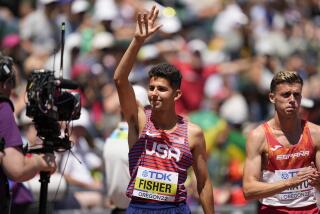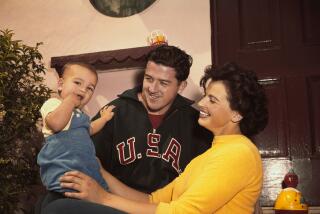Olga Appell Was Born to Run, Naturally : Track: With her husband’s coaching, ex-secretary has become one of world’s fastest distance runners.
- Share via
COSTA MESA — It certainly wasn’t the most romantic proposal, but Brian Appell simply had to ask.
“Olga, dear,” Appell, an exercise physiology buff, said to his wife early one morning. “May I take your pulse?”
One minute--and 38 heartbeats later--Brian Appell had his answer: His wife was born to run. Never mind that she had no athletic background. Her slow heart rate, Brian figured, signaled potential success.
That was five years ago. Today, Olga Appell, a 28-year-old former bank secretary from Durango, Mexico, has the fastest women’s 10,000-meter time in the world this year.
Her winning mark of 32 minutes 9.6 seconds at Mt. San Antonio College Relays last week signaled yet another breakthrough, one that she hopes will be indicative of faster times in the future.
Last summer, Appell beat the heat and humidity of Havana, Cuba--as well as a solid field--to win the Pan American Games marathon. In February, she won the Long Beach Marathon in 2:30:43.
The latter was good enough to make the Mexican Olympic team--she had to run a sub-2:32 to qualify--but not good enough for either Appell.
“We were shooting for 2:30 flat,” Brian says, shooting a smile toward his wife. “The first seven miles, she was really walking.”
Translation: Olga ran her first seven miles at a pace of 5:50 per mile. She was aiming for an overall average of 5:43.
Those who consider a two- or three-mile jog to be a major workout, take heart. Olga Appell is indeed a special breed. Few have her degree of natural ability.
Of course, the coaching hasn’t hurt.
Brian, 32, a former track standout at Fountain Valley High School and a three-time NCAA steeplechase qualifier for Weber State, met Olga in 1985. He was a burned-out athlete living in Mazatlan, Mexico, and working as a tour guide and interpreter. She was a bank executive’s secretary in Durango, about eight hours away by car.
They met via a banking transaction. Love at first sight, both say. They were married a year later in Las Vegas.
Olga gave birth to a daughter, and the three of them moved to Frankfurt, Germany, where Brian had accepted a track coaching job with the U.S. military. Olga started jogging to lose weight. Brian noticed her natural, efficient stride. After the initial morning pulse check, he knew potential was staring him in the face.
Six months later, Olga entered her first 10-kilometer road race, finishing in around 43 minutes. A fairly impressive debut, at least by the standards of most first-time runners.
Within a year, though, Olga was clocking times in the 1,500 and 3,000 meters--4:22 and 9:22--that were among the best in Mexico. She flew to Mexico for the national championships, where she won the 3,000 and took second in the 1,500.
She returned to Germany with increased confidence but couldn’t win a race. She didn’t realize she was running on the prestigious European circuit. She didn’t know those she competed against were some of the best in the world.
Brian certainly wasn’t going to tell her. He knew the power of naivete. He understood how athletes often perform better when they don’t realize they’re running far beyond reasonable expectations.
“She was getting blazed by the other runners,” he said. “But in a way, it was helping her psychologically.”
Olga’s progress continued. There was a 52:10 15K. Then a 1:11:20 half-marathon. And her track 10,000 debut, a 32:49.
Her debut at 26.2 miles--2:40:04 at the 1990 Twin Cities Marathon--might have been impressive to many, but she thought it a great disappointment. She was shooting for 2:32.
“I was finished with my military term in Germany,” Brian said. “We were going to go back to Mexico. But Olga was too embarrassed. She thought the time (at Twin Cities) was much too slow.”
So they settled in Albuquerque, N.M., a popular high-altitude training site for world-class runners. Olga’s times continued to drop.
After her victory at the Pan American Games last summer, Olga and Brian returned to Durango. But they could not stay. She had become a national hero. She was swamped with invitations to state functions and could not train properly. So it was back to Albuquerque for a while.
They have a home in Durango, a large city at an elevation of 7,400 feet. Brian, who was recently selected as one of three national distance-running coaches for Mexico, has set up a permanent running camp adjacent their house.
For the next few weeks, though, the Appells are living life on the road.
Last week after Mt. SAC, they stopped in Costa Mesa for a few days to visit Brian’s cousin, Charlie Appell, an assistant track coach at Estancia High School. On Saturday, Olga flew to New York to compete in a road race. This week, they are in Barcelona to check out the Olympic marathon course, which Brian says suits Olga perfectly.
“She’s great with hills, heat and humidity,” Brian says. “Barcelona’s going to be hot and the last four miles of the course has a 10% grade all the way up to the stadium.”
Olga, who knits before races to calm her nerves, says her goal for the Olympic marathon will be to finish in the top 10. But Barcelona is simply a stepping stone, her coach reminds her.
“Of course she has aspirations of winning this one,” Brian says. “But, if anything, 1996 will be her year. . . . Eventually, I see her being able to run around 2:18.”
That would be about three minutes faster than the current world record, Olga is told. Yes, she says. She understands there is much work ahead.
More to Read
Go beyond the scoreboard
Get the latest on L.A.'s teams in the daily Sports Report newsletter.
You may occasionally receive promotional content from the Los Angeles Times.






